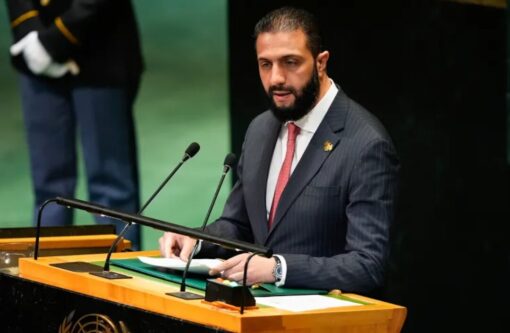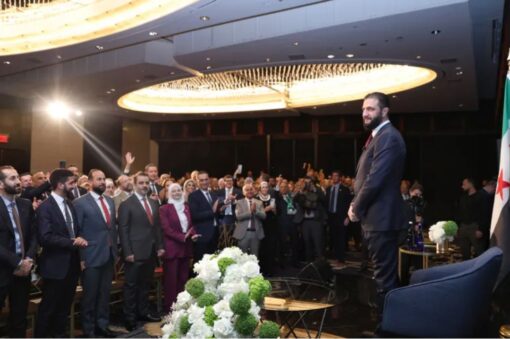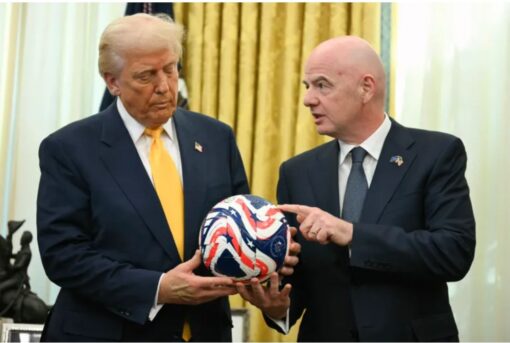Syrian President Ahmed al-Sharaa has delivered a dramatic first address at the United Nations General Assembly, demanding the complete lifting of international sanctions on his country while declaring Syria’s return to the global stage after decades of war and isolation.
His speech, broadcast across Syria and watched by millions, was hailed by supporters as a turning point in the nation’s modern history.
Al-Sharaa’s presence at the podium in New York marked the first time in nearly 60 years that a Syrian head of state addressed the world body. His words carried both symbolism and urgency, as he sought to convince foreign powers to lift restrictions that continue to suffocate Syria’s economy even after the end of Bashar al-Assad’s long rule.
The Syrian president described his nation’s struggle as one of survival and dignity. “Syria is reclaiming its rightful place among the nations of the world,” he declared. He told world leaders that his country’s journey was “a story filled with pain and hope, a struggle between good and evil, and a rise from injustice to dignity.”

For ordinary Syrians watching from Damascus, Aleppo, Homs and beyond, the moment was electrifying. Celebrations erupted in major cities, with fireworks lighting the sky as citizens gathered in public squares to witness their leader’s historic appearance.
Al-Sharaa, who came to power in January after leading the final push that ended Assad’s five-decade family rule, used the occasion to lay out his government’s achievements and vision.
He highlighted the establishment of new political institutions, a roadmap for national elections, and an appeal for foreign investment to rebuild a country devastated by conflict.
His central demand, however, was unequivocal: the total removal of sanctions that he said were shackling the Syrian people and slowing national recovery.
“We call now for the complete lifting of sanctions, so they no longer chain Syrians to poverty and despair,” he said, addressing the assembly with calm but forceful determination.
The sanctions question remains a complicated one. Earlier this year, US President Donald Trump signed an executive order that lifted decades-old measures targeting Damascus.
However, the Caesar Syria Civilian Protection Act, passed by Congress in 2019, continues to impose restrictions, particularly on investment and reconstruction projects. While some in Washington have floated repealing the law, others argue it must remain until Syria meets benchmarks on accountability and governance.
Al-Sharaa’s appeal was reinforced by his government’s recent diplomatic outreach. In recent months he has traveled to Paris to meet President Emmanuel Macron, held talks with regional leaders in Riyadh, and even met Trump during a state visit to Saudi Arabia.
Observers have described this as a calculated charm offensive, designed to reposition Syria as a legitimate international actor after years of pariah status.
His presence at the UN General Assembly underscored that strategy, offering Syria a platform to reshape its image and build bridges with old adversaries.
The Syrian leader also used his speech to condemn Israeli air strikes, which he said had continued even as his government focused on internal reforms. “Israeli attacks against Syria have not ceased.
They undermine regional stability and contradict the world’s stated support for our recovery,” he warned. At the same time, he pledged commitment to dialogue, citing the Disengagement of Forces Agreement of 1974 and calling on the international community to stand with Syria against what he termed “illegal aggression.”
Syria and Israel remain deeply divided over the Golan Heights, territory seized in 1967, and tensions have continued for decades.
Al-Sharaa insisted that his government was committed to avoiding escalation, but emphasized that sovereignty and territorial integrity could not be compromised.
His remarks came amid reports that Israel and Syria may be negotiating a limited de-escalation arrangement through US mediation, signaling possible changes in a long-frozen conflict.
Beyond the regional disputes, al-Sharaa devoted a significant portion of his address to Palestine. As war continued in Gaza, he spoke firmly in support of Palestinians. “Syria stands with Gaza, with its children and women, and with all peoples facing violations and aggression,” he said, urging an immediate end to the war.
His solidarity message resonated strongly across Arab states, many of which have cautiously re-engaged Damascus since Assad’s fall.
The Syrian president ended his speech with a somber reflection on his own nation’s suffering. “The horrors that Syria endured, we wish upon no one,” he said. “We are among the people most aware of the pain of war and destruction. Our message today is one of rebuilding, reconciliation, and respect.”
Reactions to his address have been mixed. Supporters in Syria and across the region celebrated the speech as evidence of a new chapter. State media called it “a moment of rebirth” and emphasized the symbolism of a Syrian leader addressing the UN without the shadow of Assad.
Iran welcomed the remarks as a step toward justice and independence, while Turkey expressed caution, insisting that Damascus must prioritize humanitarian issues and the return of displaced civilians.

In Western capitals, the response has been more reserved. Some officials acknowledged al-Sharaa’s calls for reconstruction and reintegration, but skepticism lingers about his ties to the armed group Hayat Tahrir al-Sham, which he once led before it was removed from the US terror list earlier this year.
Lawmakers in Washington remain divided over how to approach Syria under his leadership, with some pushing for cautious engagement and others warning against premature normalization.
Despite uncertainty, the spectacle of Syria’s interim president standing before the UN General Assembly, demanding the end of sanctions and pledging national renewal, represented a striking shift.
For Syrians watching at home, it was more than a speech—it was a signal that their country, after years of bloodshed and isolation, was fighting to be seen again as part of the international order.
Whether al-Sharaa’s appeal will convince skeptical governments is unclear. What is certain, however, is that his words have already entered the political lexicon of a region desperate for stability. For many, his appearance at the UN was not just a plea but a declaration that Syria is determined to reclaim its place in global affairs.


